Linda Bhatia

Linda Bhatia is Michael Bhatia’s mother. She lives in Fort Ticonderoga, New York and Medway, Massachusetts, where Michael grew up.
Michael Bhatia

Michael Vinay Bhatia ’99 died May 7, 2008 in Afghanistan, where he was working as a social scientist in consultation with the US military in the Human Terrain System. Michael was a visiting fellow at the Watson Institute from July 2006 to June 2007. At the Institute, he was involved in a research project on Cultural Awareness in the Military while writing his PhD dissertation and teaching a senior seminar on “The US Military: Global Supremacy, Democracy and Citizenship.” Michael was a doctoral candidate in the Department of Politics and International Relations at the University of Oxford where he was a George C. Marshall Scholarship in 2001 and a Scoville Peace Fellow in 2000, after graduating from Brown University magna cum laude in 1999 with a degree in International Relations. Over several years, Michael’s research and humanitarian work took him to such conflict zones as Sahrawi refugee camps, East Timor, and Kosovo, in addition to five research trips in Afghanistan.
Tricia Bhatia

Tricia Bhatia is Michael Bhatia’s sister.
Keith Brown

Keith Brown is a sociocultural anthropologist specializing in the study of twentieth-century Macedonia, the evaluation of democracy promotion programs; identity politics in diasporic communities; and what the US military learned about culture from its experience in Bosnia and Kosovo. He is a co-founder and director of research on the Cultural Awareness and the Military Project at the Watson Institute for International Relations at Brown University, and is a primary consultant for Human Terrain.
Jarat Chopra

Jarat Chopra is currently president of Peacemaintenance International, which specializes in ground assessments, and planning and implementation of conventional and unconventional peace operations. Earlier this year, he developed the United Nations’ system-wide strategy for Somalia through the first use of a “Strategic Assessment.” He was a faculty member at Brown University from 1990 to 2007, serving as director of the International Relations Program. During his time at Brown he was a mentor to and close friend of Michael Bhatia.
James Der Derian

James Der Derian is a research professor at the Watson Institute for International Studies at Brown University where he directs the Global Media Project and co-founded the ‘Cultural Awareness and the Military Project.’ He is author most recently of Virtuous War: Mapping the Military-Industrial-Media-Entertainment Network (2nd Ed., Routledge, 2009), and of Critical Practices in International Theory (Routledge, 2009). He has produced two other documentaries, Virtual Y2K and After 9/11.
Steve Fondacaro
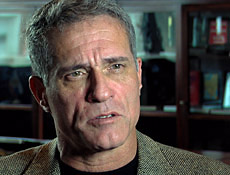
Steve Fondacaro PHD is the Project Manager U.S. Army Human Terrain System HTS at TRADOC (U.S. Army Training and Doctrine Command) in Fort Leavenworth, Kansas. In 2005 he and Montgomery McFate began developing the Human Terrain System, which has become central to American counterinsurgency strategy in Afghanistan.
Tom Garcia

In 2008, Tom Garcia served as a Team Member with Michael Bhatia on the Human Terrain Team One outside Khost, Afghanistan and is now a Human Terrain Instructor at Fort Leavenworth, Kansas (TRADOC).
Roberto Gonzalez

Roberto Gonzalez is a sociocultural anthropologist whose work focuses upon the relationship between humans and their environment; science, technology, and society; militarism and culture; and anthropological ethics. He has conducted ethnographic research in Latin America and the United States. His books include: Zapotec Science: Farming and Food in the Northern Sierra of Oaxaca (2001), Anthropologists in the Public Sphere: Speaking Out on War, Peace, and American Power (2004), and American Counterinsurgency: Human Science and the Human Terrain (2009). He is a founding member of the Network of Concerned Anthropologists and published a chapter “Embedded” in The Counter-Counterinsurgency Manual (2009).
Philip Gourevitch
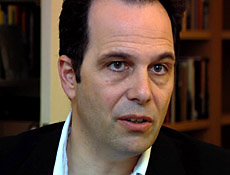
Philip Gourevitch is an American author and journalist, is the editor of “The Paris Review” and a longtime staff writer of The New Yorker. His most recent book is “The Ballad of Abu Ghraib,”, an account of Iraq’s Abu Ghraib prison under the American occupation, which was originally published as Standard Operating Procedure. Gourevitch has written on a variety of subjects — from ethnic conflicts in Africa, Europe and Asia to political corruption in Rhode Island and the music of James Brown. He became widely known for his first book, We Wish To Inform You That Tomorrow We Will Be Killed With Our Families, which tells the story of the 1994 Rwandan Genocide.
Hugh Gusterson
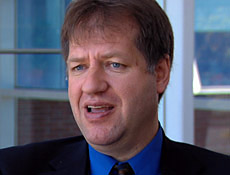
Hugh Gusterson is a professor of Anthropology at George Mason University researching nuclear weapons, militarism, anthropology of science, social movements, pharmaceutical cultures, American culture, public anthropology, and social theory. He also writes about militarism and about science more generally, and has a strong interest in professional ethics. He is the author of Nuclear Rites (UC Press, 1996) and People of the Bomb (Minnesota, 2004) and co-editor of Cultures of Insecurity (Minnesota, 1999) and Why America’s Top Pundits Are Wrong (UC Press, 2005), Why America’s Top Pundits Are Wrong (UC Press, 2005), and The Insecure American (UC Press, 2009). He is a founding member of the Network of Concerned Anthropologists and published a chapter “Militarizing Knowledge” in The Counter-Counterinsurgency Manual (2009).
LT. Colonel Jay Hatton

LT. Colonel Jay Hatton, is Associate Dean for Warfighting at the Marine Corps Command Staff College, and is a U.S. Marine Corps Regimental Commanding Officer.
Christopher Hitchens

Christopher Hitchens is an American author, journalist, and literary critic. He has been a columnist at Vanity Fair, The Atlantic, World Affairs, The Nation, Slate, Free Inquiry, and a variety of other media outlets making him a staple of talk shows and lecture circuits. In 2009 Hitchens was listed by Forbes magazine as one of the “25 most influential liberals in U.S. media.
Richard Holbrooke

Richard Holbrooke is the Special Representative for Afghanistan and Pakistan, working under President Barack Obama and Secretary of State Hilary Clinton. He most recently served as the United States ambassador to the United Nations, where he was also a member of President Clinton’s cabinet (1999-2001). As assistant secretary of state for Europe (1994-1996), he was the chief architect of the 1995 Dayton peace agreement that ended the war in Bosnia. He later served as President Clinton’s special envoy to Bosnia and Kosovo and special envoy to Cyprus. From 1993-1994, he was the US ambassador to Germany. After joining the foreign service in 1962, he served in Vietnam (1963-66), including a tour of duty in the Mekong Delta for AID. He worked on Vietnam at the Johnson White House (1966-68), wrote one volume of the Pentagon Papers, and was a member of the American delegation to the Vietnam Peace Talks in Paris (1968-69). He graduated from Brown University in 1962.
Fred Kaplan

Fred Kaplan is a journalist and contributor to Slate magazine. His “War Stories” column covers international relations and US foreign policy. Prior to writing for Slate, Kaplan was a correspondent at the Boston Globe, reporting from Washington DC, Moscow, and New York City. He was a member of a team that won a Pulitzer Prize for a special Sunday Boston Globe Magazine on the U.S.-Soviet nuclear arms race. His 1983 book on the men who invented nuclear strategy, The Wizards of Armageddon, won the Washington Monthly Political Book of the Year award. In early 2008 he published Daydream Believers[1], which discusses the Bush Administration’s use of Cold War tactics in post 9/11 actions. In the book he explores why the administration has pursued policies he believes to be unilateral action and pre-emptive warfare.
LT. Colonel Andrew Kennedy

LT. Colonel Andrew Kennedy is the Urban Warfare director at the Twentynine Palms Marine Air Ground Combat Center in Twentynine Palms, California.
LT. Colonel Patrick Kline
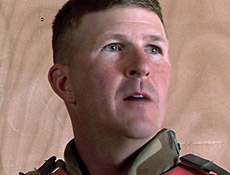
LT. Colonel Patrick Kline, is the Director of the Urban Warfare Training Program in ‘Mojave Viper’ at the Twentynine Palms Marine Air Ground Combat Center in Twentynine Palms, California. Previously he was a battalion instructor-inspector of the 4th Marine Division in the during the relief operations in New Orleans after Hurricane Katrina.
Catherine Lutz

Catherine Lutz is the Thomas J. Watson, Jr. Family Chair of Anthropology and International Studies at Brown University and holds a joint appointment with the Department of Anthropology, which she chairs. She is the past president of the American Ethnological Society, the largest organization of cultural anthropologists in the U.S. and a founding member of the ‘Network of Concerned Anthropologists.’ Her recent publications are ‘The Bases of Empire’ (2009), ‘Carjacked’ (2010), and the chapter ‘The Military Normal’ in ‘The Counter-Counterinsurgency Manual’ (2009). At the Watson Institute, Catherine is a co-founder and director of research on the Cultural Awareness and the Military Project, and is a primary consultant for Human Terrain.
Jackie Lyden

Jackie Lyden is a radio correspondent and host primarily working for National Public Radio. She contributes to a variety of programs at NPR, reporting extensively from the Middle East. She is also the weekend host for the daily program All Things Considered.
Major William S. McCallister

Major William S. McCallister is a retired military officer. He has worked extensively in Europe, Asia and the Middle East. While on active duty, Mr. McCallister served in numerous special operations assignments specializing in civil-military, psychological and information operations. McCallister is currently employed as a senior consultant for Applied Knowledge International (AKI) in Iraq. He continues to study current events in Iraq in tribal terms, including the tribal art of war and peace, tribal mediation processes, development of tribal centers of power, and tribal influence in political developments. He has applied his study of tribal culture in assessing Iraqi reconstruction efforts, as well as insurgency and counter-insurgency operations in Iraq and the Global War on Terror.
Montgomery McFate

Montgomery McFate is a cultural anthropologist and a defense and national security analyst, and one of the primary architects of the United States Army Human Terrain System program. She co-directs the Human Terrain System with Steve Fondacaro in TRADOC, Fort Leavenworth, Kansas, and co-wrote Chapter Three: Intelligence in the US Army Counterinsurgency Field Manual FM 3-24 (2006).
Major General O’Dell
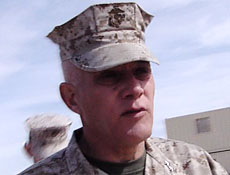
Major General O’Dell, Commanding General, 4th Marine Division. Previously he served as the Commanding General, 4th Marine Expeditionary Brigade (Anti-Terrorism). In June, 2007 O’Dell was appointed by President Bush to serve as Coordinator of Federal Support for the Recovery and Rebuilding of the Gulf Coast Region after Hurricane Katrina.
Senior Interrogator Michael Ritz
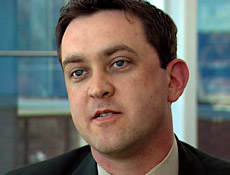
Senior Interrogator Michael Ritz, Team Delta U.S. Army, and Former Instructor at the SERE School (Survival, Evasion, Resistance and Escape).
Barak Salmoni

Barak Salmoni is an Assistant Professor in National Security Affairs at U.S. Naval Postgraduate School, Monterey, CA. From October 2003 to January 2004 he trained elements of the 1st Infantry Division and National Guard on operational culture in Iraq. From 2003 to 2004, he worked with the 1st Marine Division’s command training focusing on issues of indigenous culture, mores, and Iraqi public sentiment as impacts Operation Iraqi Freedom 2. He worked with the Marines in Iraq in 2004 and has since been an architect of the Marine Corps Training Education Command and an assistant professor at the Center for Contemporary Conflict.
Brian Selmeski
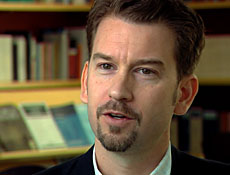
Brian Selmeski is a cultural anthropological research associate at the Royal Military College of Canada’s Centre for Security, Armed Forces & Society in Kingston, Ontario, and coordinator of the Military Anthropology Network. He is also a member of the Air Force Culture and Language Center at Air Force University.
Sergeant Frank Tramano
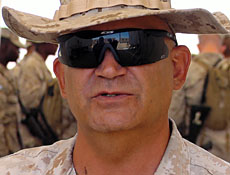
Sergeant Frank Tramano, is a Simulation Trainer in ‘Mojave Viper’ at the Twentynine Palms Marine Air Ground Combat Center in Twentynine Palms, California.
Gunnery Sgt. Peter Walz USMC
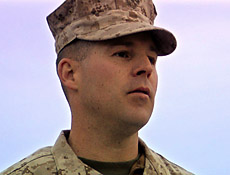
Gunnery Sgt. Peter Walz USMC, Public Affairs Officer in ‘Mojave Viper’ at the Twentynine Palms Marine Air Ground Combat Center in Twentynine Palms, California.
Francis J. ‘Bing’ West

Francis J. ‘Bing’ West, an author of military books, served as Assistant Secretary of Defense for International Security Affairs during the Reagan Administration and is currently president of the GAMA Corporation, which designs wargames and combat decision-making simulations. His 2004 book The March Up: Taking Bagdhad with the First Marine Division was awarded the Marine Corps Heritage Prize for Nonfiction, as well as the Colby Award. He is currently writing the screenplay for No True Glory, with his son Owen, for Universal Studios. West is a correspondent for The Atlantic Monthly, appears on The News Hour on PBS and is a member of the Council on Foreign Relations.
Captain Alex Wright

Captain Alex Wright, Civil Affairs Officer and Instructor in ‘Mojave Viper’ at the Twentynine Palms Marine Air Ground Combat Center in Twentynine Palms, California.
